(Photo: Irrigation channel project, Luvielle village: (UK volunteers) Usman, Emily, Sabah and Lisa with Chief Mr Banda, the chief’s mother, and villagers.)
Moni! Bobo! (Hello, hiya) from us in Salima, Malawi!
Life here in Salima is absolutely amazing! Apart from the terrifying and strange bugs which we encounter in our rooms here at our accommodation on a regular basis and having cold showers…
Our experiences so far have been incredibly educational, exhausting, and life-changing.
We have been working with Environment Africa (EA), whose main aims are to implement sustainable farming methods in different villages. We are conducting two major projects in TA (Traditional Authority) Khombedza and TA Mososoa. This means EA have not let us rest…
We have been getting down and dirty with our hands and our feet in cow pooh, a whole lot of digging, pumping wells and other physical tasks. I’m pleased to say from all this practical work I’m actually losing weight! Wahey!
The first week in Salima
On our arrival in Salima we were happy to meet our local volunteers. We have grown immensely close to these lovely people, who have made us feel right at home already! We then had meetings with the Environment Africa staff, another bunch of lovely people, who gave us a general introduction on who they are and what we would be doing in the following weeks. We were lucky to have Chichewa sessions from the EA guys, which was a lot to take in! But we are able to finally understand and use our basic Chichewa to string together a conversation. We also went to a village market where we were only allowed to speak Chichewa, which was a valuable opportunity to instantly put our learning into practice. We were also taken to visit the local hospital and clinics just in case of an emergency. Witnessing the hospital was pretty sad and gave me the shivers. The state of the people in the waiting rooms was heart-breaking, but the smiles of the patients, especially the children made me feel again how courageous Malawians are.
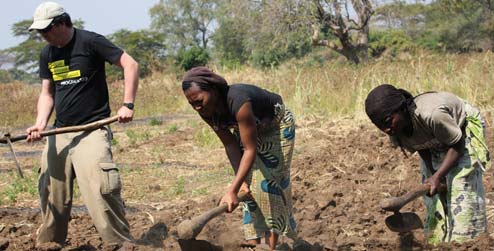 (Irrigation channel project, Luvielle village, John (UK volunteer) with Joanna (EA staff) and a villager digging the canal)
(Irrigation channel project, Luvielle village, John (UK volunteer) with Joanna (EA staff) and a villager digging the canal)
We got our first flavour of our projects when we went to see the process of beneficiary identification. This system involved villagers nominating each other to receive sweet potatoes, maize and seeds. It was interesting to learn how this process worked and it was also thought provoking to observe and compare the huge differences between a village meeting and a typical council meeting held in a town hall back in the UK. In the first week, we were also taken to a village where we were introduced to solar irrigation schemes. This village welcomed us by playing drums and singing and dancing, which was exciting! The girls - Lisa, Emily and I got our booty’s shaking as we were made to join the women in the circle to dance. The guys - John and Usman loved it, just sitting back and watching us! Maybe laughing at our NOT SO GOOD African dancing too! Cheeky monkeys.
Starting work
Since the official project works have begun we have been involved in a variety of different activities. Every day we visit different villages consisting of different tribes, sometimes the ‘Chewa’ tribe (who are predominantly Christian) and sometimes the ‘Yao’ tribes (who are predominantly Muslim). With our group containing volunteers who are both Christian and Muslim, it has been so good to experience the best of both worlds. The two different tribes have been welcoming and respectful as each other.
Our first day at Luvielle village included digging an irrigation channel. This effective project was implemented by an 18 year old student Joanna Chigwede from the Agricultural College who works with Environment Africa. Digging the long canal in the field was tiring but worth it, as we were honoured to be working alongside the village head Mr Banda, his family and some of the villagers.
We then pumped up water from a treadle pump which beautifully flowed and sparkled under the sun through the canal to its tributaries. What amazed me during this work day was seeing young village girls from the age of 16 to 20, digging alongside us with babies on their backs. They didn’t seem to get tired at all. I have to say that I met what you truly call strong inspirational women.
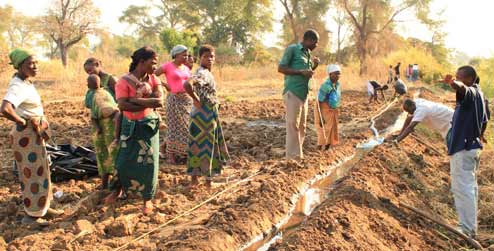 (Irrigation channel project, Luvielle village: The water being pumped through the canal we dug)
(Irrigation channel project, Luvielle village: The water being pumped through the canal we dug)
Although I and Usman had begun fasting, as it’s the holy month of Ramadan, we joined the others in cooking lunch. This included the girls washing and cutting vegetables such as tomatoes, turnips and spinach, cleaning rice and cutting beef and the guys creating the fire. It was good fun and a great learning experience on how villagers cook their food every day. Following this we visited Eliyah village where we were greeted by singing and dancing. We pedal pumped water, dug vegetable beds, planted seeds and watered them. We also met an EA employee who is a German engineer who has been living in Malawi for a couple of years; he showed us two Christian Aid funded solar-irrigation projects, neither of which worked properly. We talked to him about why they didn't work and on how they could improve these failed solar-irrigation projects.
 (UK volunteers Emily and Lisa washing vegatables for lunch)
(UK volunteers Emily and Lisa washing vegatables for lunch)
The Salima District Agriculture show
At the end of this week, the highlight was visiting the Salima District Agricultural show. We were involved in judging different harvested products by villagers. We saw some amazing creations, such as humongous pumpkins and sweet potatoes, sacks of pure white cotton, beautiful chickens and bird houses etc. At the end we witnessed speeches by VIPs of the Agricultural society and prizes were given to the winning villagers. These prizes included bicycles, fertilisers and wheel-barrows. Seeing the happy and proud faces of the villagers when their names were announced, made me feel how much this competition meant to them. We felt pretty guilty as a team made to judge, because we wish we could give prizes to every single participant for their hard work and effort.
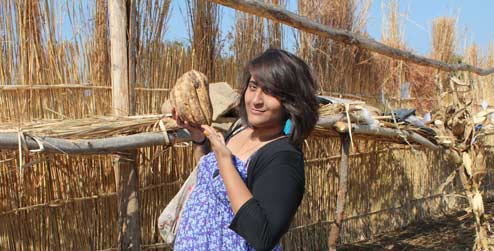 (The District Agricultural show: (UK volunteer) Sabah presenting the biggest sweet potato she’s ever seen!)
(The District Agricultural show: (UK volunteer) Sabah presenting the biggest sweet potato she’s ever seen!)
Making manure
Our third week in Salima has been based on conservation farming. We have been learning the processes of manure making and mulching, which we have then implemented in different villages such as Kamuon and Mososoa. The team have been accompanied by an Agricultural Extension Officer for every village we go to who acts as the instructor to the villagers. Manure making has been very messy. It has involved mixing cow dung, maize stalks, ash, yeast and water. Lisa and I even stomped on wet cow pooh bare-footed to create a liquid texture. We also visited fishing villagers during the third week and I interviewed a fisherman about his struggle in today’s climate.
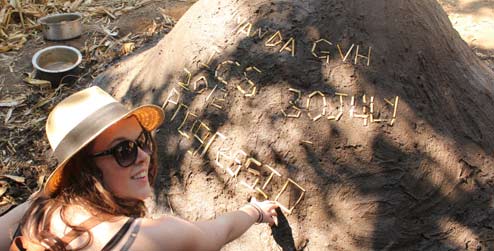 (An example of a manure pile we made. (UK volunteer) Emily leaving our mark in Nyanda GVH village)
(An example of a manure pile we made. (UK volunteer) Emily leaving our mark in Nyanda GVH village)
During the end of this week, the highlight was the football game which Environment Africa organised in Mososoa village. It was incredible to see over a thousand villagers all gathered for the games! Volunteer Usman was part of the green team, watching him was hilarious! He was so confused at how differently the guys play football and he was getting frustrated as nobody was passing him the ball.
So we have been very busy since we’ve got to Salima! Aside from our work with Environment Africa, Emily, Usman and I have also discovered an orphanage just behind the lodge where we are staying and go there in our free time to play with the children. John visits the local church on Sundays; Usman visits the local Mosque on the evenings that he is able to…
Every day is exciting and we learn something new. We’re getting used to this place. Scary how it’s been a month already! Don’t want to think about leaving yet.
Hope you enjoyed reading about our experiences here in Salima, Malawi so far! Zikomo Kwambiri (Thank you very much)…
By ICS volunteer Sabah Amreen Chohan


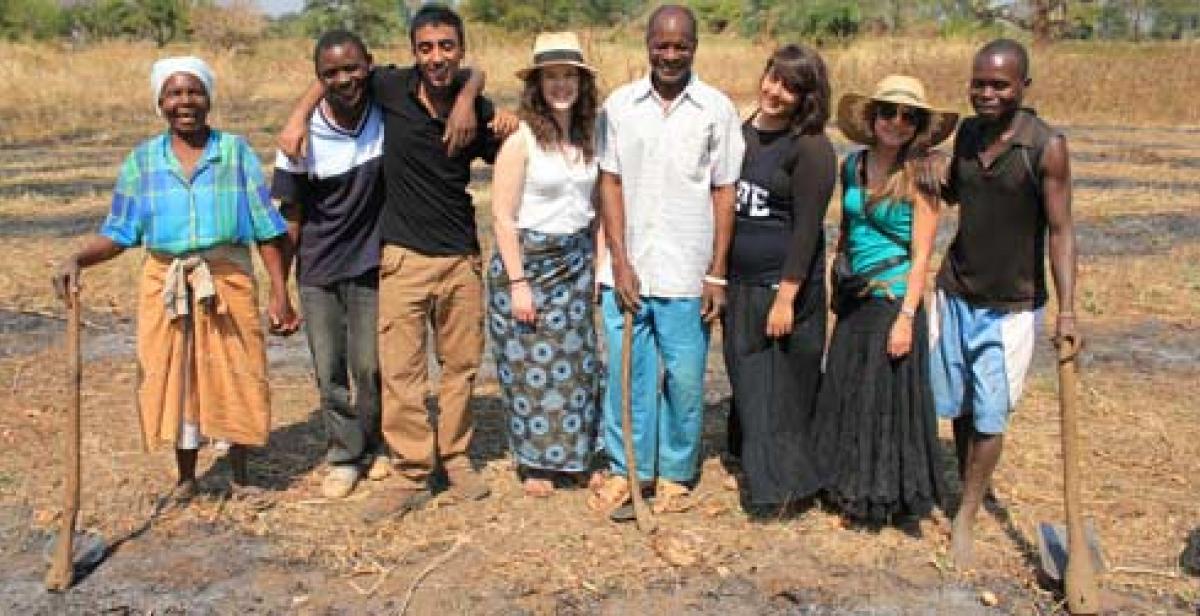

Comments
Nice work guys!!!!!!!!!!!!!p
Nice work guys!!!!!!!!!!!!!p